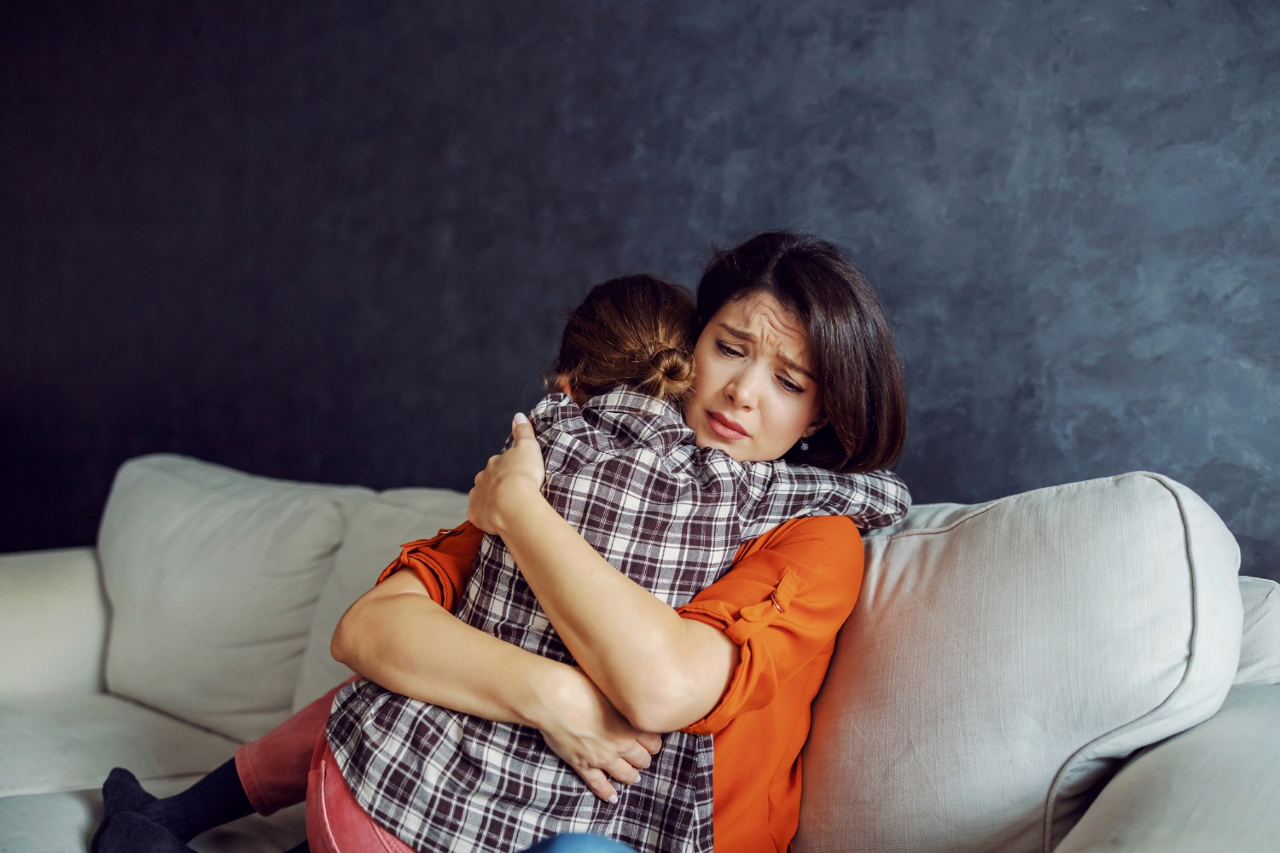
12 Ways to Help Lower Your Child’s Stress and Anxiety
As adults and parents, we often forget or fail to realize that children can get stressed out or anxious too. When we think they are simply misbehaving they really could be dealing with something deeper. Children don’t always know how to express how they’re feeling and may not understand why they are feeling this way.
As parents, we can learn to recognize the signs and symptoms to help our children get through their stress and anxiety. We can teach them that they are not alone, and most of all give them love and support.
Learn the causes and symptoms of stress and anxiety in children and 12 ways we can help them when they’re feeling this way.
Causes and Symptoms
Any situation requiring a child to adapt, or change can present childhood stress. It can be caused by positive change like starting a new activity or new school but is most linked to negative changes such as illness or a family member passing away.
Tiny amounts of stress can be good, but excessive stress can affect the way children think, act, and feel. As children grow and develop, they learn how to respond to stress. Stressful events that adults can manage will cause stress in a child.
Causes or stressors are pain, injury, illness, and other changes.
Stressors:
- Worrying about schoolwork and/or grades
- Juggling school and work or sports
- Problems with friends, bullying, or peer pressure
- Changing schools, moving, or dealing with housing problems or homelessness
- Having negative thoughts about themselves
- Going through puberty
- Watching parents divorce or separate
- Family money problems
- Living in an unsafe home or neighbourhood
Physical symptoms can include:
- Decreased appetite, other changes in eating habits
- Headache
- New or recurrent bedwetting
- Nightmares
- Sleep disturbances
- Upset stomach or vague stomach pain
- Other physical symptoms with no physical illness
Emotional or behavioural symptoms may include:
- Anxiety, worry
- Not able to relax
- Fears, new or recurring (of the dark, being alone, of strangers)
- Clinging, unwilling to let you out of sight
- Anger, crying, whining
- Unable to control emotions
- Aggressive or stubborn behaviour
- Reverting to behaviours present at a younger age
- Refusal to take part in activities
Here are some things you can do to help your children lower their stress and anxiety levels.
1. Encouragement of Facing Their Fears
We tend to avoid situations we are afraid of, however, by doing so this keeps our anxiety. If your child faces their fears, they learn over time the anxiety will reduce naturally on its own. Our bodies have a system to calm us down as it cannot remain anxious over an extended period. If you stay in your anxiety-provoking situation, your anxiety will reduce within 20-45 minutes.
2. Perfection Isn’t Everything
Sometimes we get ahead of ourselves, feeling it necessary for our children to be perfect at everything they do such as sports, school, and other performance situations. But we forget they are kids, and they need to be kids. Encouraging them to do well is one thing, but if an 85 isn’t good enough that’s not enjoying their learning. Help them work hard but also accept and embrace their mistakes and imperfections.
3. Focus on Positivity
Children who are anxious and stressed can become lost in negative thoughts and self-criticism. By focusing on your child’s positive attributes and good aspects of a situation, the more it (and you) will remind your child to focus on the positives.
4. Schedule Relaxation Time
Activities like sports can become more about competition and success than about fun. Children need time to have fun as well as relax and be calm. Include some time in their day for them to play with toys, play a game, sport (non-competitively), do yoga, paint, have a tea party, put on a play, or just be silly. There are many things you can do to interact with them to have fun and relax, or simply let them explore on their own.
5. Monkey-See Monkey-Do: Behaviour, Self-Care, and Positive Thinking
You are your child’s role model; they will do what you do. Children’s behaviours are learnt from watching their parents. If you avoid anxiety-provoking situations, your child will too. If you face your fears, they will too. When you schedule time for your self-care needs, your child learns self-care is an important part of life. Think about your own psychological well-being as well as your child’s.
6. Reward Brave Behaviours
If you set up a reward as a motivator prior to your child being in a situation it isn’t bribery. By rewarding behaviours, such as facing their fears, your child will engage in them more often. Something like a sticker, small treat, praise, or a hug can be a simple reward for brave behaviour.
7. Bedtime Routine
By having a bedtime routine and sticking to it 7 days a week, it will help your child transition from activities of the day to the necessary relaxed state to fall asleep. It should be 30-45minutes including brushing their teeth, getting on pajamas, and so on, winding down to their set bedtime.
8. Encourage Expression
You’re not helping your child when you tell them, “You’re fine,” or “No you’re not,” after they’ve expressed that they are worried or scared. After hearing that, they may believe you are not listening to them or do not understand them. You can support their experience by engaging in discussion of their emotions and fears, starting the conversation with, “Yes, you seem scared. What are you worried about?”
9. Problem Solving
After confirming your child’s emotions and proving you understand their experience and are listening to what they have to say, you can now help them to problem solve. Not meaning to solve the problem for them, but rather help them to find practical solutions. If they can produce solutions, fantastic. If not, you can help create some potential solutions for your child and ask them to pick the solution that they think would work best.
10. Stay Calm
As we know, children look to us parents for guidance to figure out how to react in situations. We’ve seen a young child trip and fall, then look to their parents for their reaction. If they look concerned, they cry, because the child looks to their parents for a signal of how to react to the situation. No matter what age, children resonate and pick up on their parent’s emotions. If you are anxious, your child will pick up on it and experience an increase in their own. When you want to manage your child’s stress and anxiety, you must manage your own. Start by slowing down your own speech, taking a few deep breaths to relax, and work to show your facial expression conveys a sense of calm.
11. Practice Relaxation Exercises
Basic relaxation can help your child reduce their stress and anxiety. Start with a few slow, deep breaths, which you do with them so they can match your pace. Another exercise you can get your child to do is to ask them to imagine themselves somewhere like the beach or relaxing in a backyard hammock. Get them to close their eyes and imagine the sounds, smells, and sensations associated with the image.
Close your eyes and imagine you are on a beach. Listen to the sound of the waves coming in and out. Listen to the seagulls in the distance. Focus on the feeling of warm sand beneath your fingers as the sun warms your skin.
These are just a few techniques your child (or yourself) can do during stress and anxiety-provoking situations.
12. Do Not Give Up
Stress and anxiety can become a chronic struggle. Over time the cause of a child’s anxiety can change so it may feel like you are always putting out fires, so to speak. By repeating anxiety and stress management techniques, your child learns how to lower their anxiety and stress levels and cope with anxiety-provoking situations. Repetition is key. Do not give up!
If the signs of your child’s stress and anxiety do not decrease or disappear it may be time to seek help from a health care provider, counselor, therapist, or perhaps hypnotherapist.
If your child becomes withdrawn, more unhappy, or depressed, has problems in school or interacting with friends or family, is unable to control their behaviour or anger, please talk to their doctor for further help.
At Healing Soul Hypnosis, I provide a safe environment to help you and your child with their stress and anxiety. If you have any questions or concerns don’t hesitate to contact me.
Creative Commons Attribution: Permission is granted to repost this article in its entirety with credit to Healing Soul Hypnosis and a clickable link back to this page.
Post a Comment
You must be logged in to post a comment.










